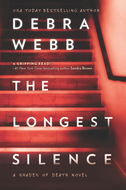Kitap dosya olarak indirilemez ancak uygulamamız üzerinden veya online olarak web sitemizden okunabilir.
Kitabı oku: «Deadly Grace», sayfa 2
CHAPTER 2
Washington, D.C.
Wednesday, January 10, 1979
Much later, when it was all over—and yet not really over because, as Alex Cruz knew, there were some events you never truly got over but only locked away in that dark recess of the mind where nightmares live—afterward, he did the calculations, backtracking, trying to figure out the exact sequence of events. Where he’d been the first time he’d heard the names Jillian and Grace Meade. Whether he’d had any premonition he was about to encounter a face of evil unlike anything he’d seen before in either his professional or personal life. Whether there’d been any warning sign that this would be the case to finally push him over the razor-thin line between the letter of the law he’d sworn to uphold and the rough justice of the vigilante; the line between his troubled past and the uncertain fate that lay ahead of him.
Even before he’d heard of these two women, Cruz had already witnessed more than his share of the horrors that human beings could unleash upon one another. He’d been a grunt in the jungles of Vietnam, then spent more than a decade as a U.S. Army criminal investigator, specializing in homicide, rape and other crimes of violence. Now, as a Special Agent with the Federal Bureau of Investigation, he spent his days tracking the worst of the worst—terrorists, kidnappers and serial killers who claimed the entire planet as their personal hunting ground.
At this point, there wasn’t much he hadn’t come across in the way of human depravity, but the events at the root of Grace Meade’s murder and the others connected to it would forever stand alone in his mind, unequaled in terms of sheer cruelty. Did he have the slightest inkling of that the day the case first landed on his desk? One thing was reasonably certain: On the night Jillian Meade was trying to die in Minnesota, Cruz would have been eighteen hundred miles away and, taking into account time zone differences, already in bed. While the fire in Minnesota blazed, trapping mother and daughter, Cruz was struggling with the restless insomnia that had plagued him for almost as long as he could remember, part of the price he paid for past mistakes. If Jillian Meade was trying to die that night, Alex Cruz had long since resigned himself to the knowledge that he was condemned for his own sins to live.
The day after the fire, Cruz arrived at the office early. If he hadn’t been trying to dodge Sean Finney, who worked in the next cubicle, he might have overlooked the notice regarding Jillian Meade, only one of at least a half-dozen pending cases sitting in his “In” basket. Given his already heavy caseload, he might have passed this one on to someone else, or at least delayed following up on it for a few days. But that morning, Cruz was determined to find a reason to get out of the office and avoid the loaded questions and broad hints Finney had been lobbing his way with increasing frequency of late. He needed a case that would take him on the road where he could slip back into comfortable anonymity.
Eleven months into a new job with the FBI, he was close to violating one of his cardinal rules: never blur the boundaries between the job and his private life. Maryanne Finney was Sean’s cousin, and Cruz had met her at a New Year’s Eve party hosted by his co-worker. An attractive redhead with hair that corkscrewed halfway down her back, Maryanne had an infectious smile that didn’t take no for an answer, even from a taciturn newcomer who tried to telegraph he wasn’t looking for romantic entanglements. Within hours of meeting her, Cruz had found himself accepting an invitation to a Sunday dinner at her parents’ home in Bethesda, seduced by Maryanne’s sweet Irish blarney when she’d assured him that it wouldn’t be a formal date but that he’d be doing her a favor by going.
“They’re a fine bunch, my family, but forever nagging me to settle down and produce a gaggle of little Finneys. They can’t help themselves. It’s a genetic defect—the Irish Catholic thing, you know. Last thing I’m interested in, believe me, after spending my days in a classroom riding herd on other people’s rambunctious monsters. If a stranger’s around, though, they’ll be on their best behavior. Might actually stifle themselves about my pitiful life, at least for one day.”
Like he himself wasn’t the pitiful one, Cruz thought, an old stray taken in by a kindhearted woman. And so it had started, light and friendly, but in the usual way of these matters, one thing had led to another. Maryanne’s enthusiasm in the bedroom, he’d discovered later that evening, was as cheerful and energetic as everything else about her. When she finally fell into sleep, it was deep and undisturbed, leaving him awake in the dark with only his guilty conscience for company. As he’d watched the pale luminous curve of her shoulder and neck in the soft glow of the candles she’d lit before they made love, he’d seen a Botticelli painting of uncomplicated virtues, a woman who, despite her protestations to the contrary, did seem to hanker after a man who’d stick around for the long haul.
He wasn’t what a nice woman like that needed or wanted. After all these years, he was too wedded to his solitude and too addicted to the job. Sooner or later, every woman with whom he got involved came to the same conclusion, and the endings were always the same—tears, angry words and self-recrimination. So Cruz had done what seemed like the kindest thing—he called Maryanne the next day to apologize for letting things go further than they should have.
He’d been avoiding Sean Finney ever since. Like every matchmaker since the beginning of time, Finney took bumptious delight in the thought that his introduction of cousin and co-worker might bear fruit. As if that weren’t bad enough, Sean was evidently plugged into some mysterious Finney family tom-tom network that seemed to have been vibrating since the moment Cruz’s path had crossed Maryanne’s, so that Sean spent half his time haunting Cruz’s cubicle, fishing for details on what was transpiring between them. She deserved better than the both of them, Cruz thought guiltily, flipping through the papers on his desk.
He was assigned to the FBI’s International Liaison Division, investigating a wide array of cross-border offenses—organized crime, kidnapping, terrorism, outlaw motorcycle gang activity, child abduction, art theft and violent crimes such as murder, rape and robbery—sifting through evidence, following up leads and liaising with law enforcement agencies domestically and internationally. During his Army career, Cruz had worked homicide cases all over the world, and the Bureau, desperate for experienced agents to help deal with the burgeoning of cross-border crime syndicates and international terrorism, had snapped him up as soon as he’d resigned his commission and his résumé had hit the street.
By 9:00 a.m., he’d narrowed down his day’s work to the two or three cases that offered him the chance to get out in the field. Before the day was out, the Meade affair would push all the others aside. It wouldn’t be long after that that he would be pursuing the elusive mystery of Jillian and Grace Meade with a single-mindedness bordering on obsession.
He was reaching for his coat when Sean Finney’s rust-colored head and myopic gray eyes suddenly popped up over the beige fabric-covered divider that separated their desks. “Hey, Alex! What’s cookin’? You comin’ or goin’?”
“Going,” Cruz replied, regretting that he hadn’t moved a little faster. Engrossed in his review of background briefs, he hadn’t even heard the voluble, heavyset Finney arrive. Yet there he was, larger than life, with his gravely smoker’s voice and his unavoidable bonhomie.
“Where you headed?”
Cruz held up a blue sheet of paper, one of the stack of color-coded international alerts that crossed their desks daily. “Gotta track down a subject, try to take a statement.”
The alerts, part of a global cooperative effort between various national law enforcement agencies, sought information and assistance in locating wanted persons. Red bulletins warned police and border checkpoints to be on the lookout for fugitives with outstanding arrest warrants. Green ones were for career criminals, like child molesters or pornographers, likely to commit repeat offenses in several countries. Yellow notices meant missing persons, gray ones detailed organized crime groups. The white notices, most often directed to Sean Finney’s desk, provided details on stolen art and cultural objects. Black diffusions sought help in identifying dead bodies that had turned up with false or missing identification.
A blue alert like the one Cruz held in his hand was a request from a foreign police agency—in this case, Britain’s Scotland Yard—to trace a witness to a crime. Many of these witnesses were actually suspects who, if the evidence panned out, would eventually be the subjects of red Fugitive Wanted notices. Once the suspect was located, an extradition request would be the next thing to come down the pipeline.
It was in this blue-printed notice that Cruz had spotted the Washington address of a witness wanted for questioning regarding two homicides that had gone down in Britain a couple of weeks earlier. One of the victims had been a seventy-one-year-old former civil servant by the name of Vivian Atwater, who’d been shot in her London apartment, which was subsequently torched. The other was a sixty-year-old spinster in Dover, England, and the murder of Margaret Entwistle appeared to have followed a similar M.O. Both women were somehow linked to an American whose address, conveniently, was right there in the capital, only a couple of miles from his office.
“ScotlandYard sent this over. They’ve had a couple of what they’re calling ‘elder murders’over the past couple of weeks,” Cruz told Finney. “They’re asking us to have a talk with a woman here in D.C. who knew both vics, see if she can shed some light.”
“She? We got a female perp?”
“Don’t know. Apparently she’d met with both victims a few days before they were killed. The fact that she called on one of the victims might be coincidence, but two starts to look a little hinky.”
“You got that right. So you’re gonna run her down?”
“Gonna try,” Cruz said as he started to lock up his cabinets.
“Need some backup?”
“I think I can handle it.”
“Oh.” Finney sounded disappointed. Cruz felt the air move as he tossed his coat over the spare chair in his cubicle, then heard the hiss of a match as his neighbor lit the first of many cigarettes that fouled the air around his desk daily.
All the more reason not to let the guy ride along in his car. Finney leaned over the divider. “If you change your mind and decide you could use some help—”
“You bet. I’ll let you know.” Cruz nodded and headed out of his cubicle. The squad room had filled by now, agents and analysts sifting paper, typing up case notes and working phones that never seemed to stop ringing.
Cruz made it as far as the elevator before his luck ran out. Finney’s voice cut through the hum like a rusty hacksaw. “Hey, Alex, by the way—seen Maryanne lately?”
Caught in a trap of my own damn making, Cruz thought grimly, as heads popped up all around. Just then, the elevator door wheezed open. He leapt on, playing deaf and dumb as he hit the Close Door button.
According to the passport details supplied by Scotland Yard, the witness sought for questioning on the two open-book homicides in the U.K. possessed dual citizenship due to her parentage. Mother: English. Father: American. Date of birth: July 14, 1944. Place of birth: Drancy, France—which, technically, Cruz supposed, would make her a citizen of that country, too, if she ever cared to claim the right. A war baby, obviously. Thirty-five years old, born on the anniversary of the storming of the Bastille.
Cruz, too, had an historic birth date: December 7, 1941, the day of the surprise Japanese attack on Pearl Harbor. This coincidence might have seemed auspicious, had he thought about it at the time and been the type to find meaning in such things. If he had, perhaps he’d have been able to predict that, with such mutually bloody birth dates, he and this woman were bound to become the bitter adversaries they did.
The address supplied in the blue notice led him to a weathered, four-story brick apartment building near Dupont Circle in downtown Washington. On the intercom board between the building’s open outer door and the locked inner door, Jillian Meade’s name was listed next to 204. Cruz pressed the buzzer and waited, peering through the art deco stained glass windows of the inner door to a black and white tiled lobby. When there was no response after half a minute or so, he tried the buzzer again, then jiggled the handle on the lobby door. Locked. Turning back to the intercom, Cruz noticed a red plastic strip punched with the letters Super in white. He tried the buzzer next to it, with the same result as before. He had just about decided the trip had been a waste of time when he was startled by a crackled shout from the overhead speaker.
“I already called the cops, assholes!”
Taken aback, Cruz hesitated, then leaned toward the intercom grill. “Is this the building superintendent?”
“Who’s this?”
“Federal agent. I’d like a word, please.” Silence. “Sir?” When there was still no answer, Cruz rang again. Nothing. He was getting ready to lean on the buzzer for as long as it took when he heard a muffled but crotchety voice from the other side of the lobby door.
“Yeah, yeah, keep yer shirt on! I’m not jet-propelled, y’-know.”
Through the stained glass window, Cruz made out the image of a small, grizzled man in a dark jump suit limping across the lobby. The old man put one rheumy eye to the glass and hollered, “You’re no cop!”
“Yes, sir, I am,” Cruz said loudly, straining to be heard through the heavy door. “Sort of.”
“What ‘sort of’? Where’s your damn uniform? Ya either are or you’re not, fella, and if you’re not, then I can tell you right now, the real ones are on the way.”
“I’m a federal agent,” Cruz said, pulling out a leather folder and slapping it up against the glass.
The old man peered at it, then pulled back, head shaking. “Well, that looks real official, I’m sure, but I’m damned if I can read it, ’specially without my glasses.”
“I’m with the Federal Bureau of Investigation, sir.”
“The whoosis? Who are they when they’re at home?”
“FBI.”
The old man cupped a hand behind his ear. “Who?”
“Sir, if you could open the door—”
“Wait, wait, lemme open the friggin’ door.” The super pushed it open a crack but stood barring the way with his bantam rooster frame. Cruz towered over him, looking down at the shine on the top of his bald head.
“Lemme see that,” the caretaker said, waving a gnarled finger at Cruz’s ID folder. “Oh, the FBI! Why didn’t you say so? Jeez, Louise! I was figuring on the D.C. coppers.”
“I don’t know anything about that, sir. I’m just trying to locate one of your tenants.”
“You didn’t come on account of I called the police?”
“No, sir.”
“Well that just friggin’ figures, don’t it?” The old man peered around Cruz toward the outer door and the street beyond. “Called more’n three-quarters of an hour ago, but they never bloody show up when you need ’em.”
“What did you call about?”
He waved an impatient hand. “Tenants were complainin’ ’bout somebody hittin’ the intercom buzzers. Then they go answer and nobody’s there. Kids, prob’ly. It’s happened before. You get these punks’ll lean on all the buzzers, see. Chances are somebody upstairs is waitin’ for pizza delivery or something, unlocks the door without checkin’ who is it. Next thing I know, I got graffiti all over the hallways and units gettin’ broke into. Real pain in the ass. One of the tenants says she saw some frizzle-headed guy wandering around a while ago, lookin’ like he didn’t know where he was going.”
“Did she speak to him?”
“Nah. Said she figured he was there to visit somebody. Only mentioned it because when she came down here, she heard a couple of the neighbors complainin’ ’bout gettin’ buzzed. I woulda gone up to check it out myself, ’cept I got this hernia problem. Goin’ in to get it fixed next week. Otherwise, I got no problem goin’ after the little buggers myself and givin’ ’em a rap upside the head so they don’t come back here. Figured I better call the cops this time, though, let them do it. Only now,” the old man added resentfully, “you tell me you’re not even the cops.”
“Sorry. I’m sure they’re on the way if you called.”
“Course I called. I said it, didn’t I?”
“Yes, you did. Look, if you like, I can go up there with you to check it out.”
The super looked him up and down for a moment, as though trying to decide whether or not Cruz made a suitable bodyguard. “Nah. It was over an hour ago already. If the guy was up to anything, he’s been and gone already. I’ll hear about it soon enough. So what about you? What do you want?”
“Like I said, I’m trying to locate someone who I understand lives in the building. A Jillian Meade?”
“Oh, yeah, sure, I know her.”
“She around, do you know?”
The super hefted his thin, blue-clad shoulders. “I dunno. You buzz her?”
“Yes, but there was no answer.”
“Then she’s probably at work.”
“Do you know where that is?” Cruz asked. “Where she works, I mean?” He was answered with another shrug. “How long has she been living here?”
“Oh, I dunno, couple, three years, at least. Yeah, at least that, come to think of it, ’cause she was here during the Bicentennial, I remember. She was one of the ones decked out her balcony in red, white and blue bunting.”
“What kind of tenant is she?” Cruz asked, pulling a notebook out of his hip pocket and making notes.
“What can I say? Pays her rent on time, quiet.”
“She’s single? Lives alone?”
“Uh-huh. Kinda shy, but okay, you know. Goes to work early, comes home between, oh, six and seven most nights, I’d say. Never had any trouble outta her.” The old man peered over Cruz’s shoulder, trying to see if he was getting this all down in his notebook.
“Any friends you can point me to? A boyfriend, maybe?”
The super thought about it, his stained fingernails scratching across the stubble on his chin. “Not really. All the time she’s been here, can’t say I seen her go out on many dates. Now and then, there’s this older guy comes around. Not that I’m spyin’ twenty-four hours a day or nothin’ like that, but my place is right down here on the ground floor, and I keep an eye on things. You gotta, in a city this size. Stuff goin’ down all the time.”
“Uh-huh. But this man who comes to see Miss Meade?” Cruz prodded. “You got a name, by chance?”
“Nah. Seen him come and go with her a few times, is all. Not a real social butterfly, is Miss Meade.”
“And he’s the only one?”
“Only one I ever seen. She ain’t ugly, that’s for sure, ’specially if you catch her without those glasses on. But she ain’t no girl no more neither, know what I mean? I figure she’s just another one of those career office gals this city’s full of. But, hey! At least she don’t make trouble, right? All my tenants should be so easy.”
“Okay,” Cruz said. “You say she gets home from work around six or so? But you don’t know where she works?”
“Well, now, hang on a minute, lemme think about that.” The old man’s bristly eyebrows skidded together over his nose as he frowned, thinking hard. “I asked her that once, now you mention it. A few months back, it was. I was up in her apartment fixin’ a leaky john. Just tryin’ to make a little conversation, ’cause God knows, that woman hardly says ‘boo’ herself. And I did ask her what she did for a living. Now where did she say she worked? It was someplace, you know, like…oh, hey!” He snapped his fingers. “I remember. The Smithsonian. Yeah, that’s it!”
Cruz’s pen paused in midair over the notebook. “Like, at that big old castle, do you mean, or at one of the other related museums? ‘Smithsonian’ covers a lot of territory.”
“Ah, well, now, that I can’t tell you. Anyway, what does the FBI want with Miss Meade? She in some kind of trouble?”
“It’s just a routine inquiry.”
“I had a guy here once worked for the State Department. FBI came around, then, too, checkin’ him out. For a security clearance, they said. That what this is about?”
“Something like that,” Cruz said. A flash of light bounced off the stained glass of the lobby door, and both men turned to see a black and white cruiser pull up to the front of the building, cherry lights rotating. “Looks like the police finally made it.”
“Well, it’s about friggin’ time.”
“I’ll leave you to deal with them, then, sir,” Cruz said, pocketing his notebook. “I appreciate your help, Mr.—?”
“Ripkin. No problem. I run a nice quiet buildin’, you know. Don’t want any funny stuff here.”
“Sure thing. Listen, Mr. Ripkin, I’m going to try to contact Miss Meade through her office, but if I miss her there, I’ll check back here again this evening. If you see her or hear from her before then, though, I’d appreciate it if you wouldn’t mention I came by.” Cruz had no idea whether or not Jillian Meade presented a risk of flight, but there was no point taking unnecessary risks.
“Whatever,” the super said distractedly, the glare returning to his beetle eyes as his attention shifted to the street, where two beefy D.C. patrolmen were lumbering up the building’s front steps. “About bloody time you guys showed up!” he hollered as the front door opened.
Cruz gave the patrolmen a sympathetic nod and slipped out around them.
There was a drugstore at the corner of the street. Cruz ducked into it to use the pay phone and put in a call to the Smithsonian Institution main switchboard. The operator, after consulting a master directory, was able to tell him there was a Jillian Meade listed on staff at the National Museum of American History, one of several buildings scattered around the capital that fell under the Smithsonian’s broad organizational umbrella.
The museum was located just across Constitution Avenue from the red-roofed buildings of the Federal Triangle. Its architecture was boxlike, a pink marble mausoleum that housed a vast collection of Americana, from the original star-spangled Banner that Francis Scott Key had seen “by the dawn’s early light,” to a pocket compass used by Lewis and Clark—a massive assemblage of memorabilia that ran the gamut from priceless national icons to sentimental kitsch.
In the main lobby, Cruz waited to ask the busy guard at the Information desk where he could find Jillian Meade’s office. All around him, the halls echoed with the shouts and laughter of children, the hissing and shushing of their teachers, and the valiant efforts of docents to be heard above the din of young voices and feet tramping across Italian marble floors. Once he’d gotten directions, Cruz dodged kids careening up and down the stairs as he made his way to the third floor, where, according to the guard, he would find Miss Meade in a corner suite of administrative offices next to the military history display.
Most of the third floor was taken up with exhibits of ceramics, printing presses, money and medals, but on the far northeast side of the floor was the permanent exhibit on the history of the American armed forces. Passing through it to reach the admin offices, Cruz ran an uneasy gauntlet past mannequins dressed in U.S. military uniforms from down through the years, standing on sober guard. There were artifacts and photos linked to various conflicts, from the Civil War, the Spanish-American War, the First and Second World Wars and the UN action in Korea, all laid out in glass-covered display cases, a proud collection of weapons, tactical plans, strategic maps and portraits of victorious men and officers.
By contrast, Cruz noted, the exhibit on Vietnam was pitifully small, tucked away in the farthermost corner of the section. It was a case study in controversy avoidance, set up to carefully dodge the temptation to assign blame for the debacle that had taken fifty-eight thousand American lives in a war that couldn’t be won. Five years after the fall of Saigon, emotions were still running too high for any kind of national consensus on that war, and the display reflected the national mood, treating the period like the historic equivalent of a drooling idiot relative whose embarrassing existence the family preferred to ignore. One day there would be a reckoning, Cruz thought. But not yet.
He was almost past the exhibit when a photograph in a case near the end of the display area caught his eye. He stopped and stared, his attention snagged not so much by the platoon of grunts in familiar jungle camouflage peering out at the camera, looking pitifully young in their face paint and false bravado, as by the buildings and hills behind them. He knew this place, he realized. Had stood on that very spot. It was a staging area outside Da Nang, a camp from which a small recon unit of seven men, himself included, had set out one day in 1966 under the command of an incompetent 1st Lieutenant named Darryl Houghton. A scared kid from Dayton, Ohio, Houghton had tried to cover his fear with bullying and intimidation, then issued one dumb order too many and never came back.
Cruz felt the air move and he looked nervously over his shoulder, but there was no one else around except for a uniformed guard standing watch over a Civil War cannon. For the moment, he was alone, falling through time and space. Logically, he knew the drumming sound in his ears was the rumble of kids’ feet running up and down distant halls and not the drone of helicopter blades, but he couldn’t explain why his nostrils had suddenly picked up the distinctive odor of heated gun oil—the familiar smell of petroleum steam that issued from the red-hot muzzle of an M-16 rifle after it had been fired. And there was something else: the sour stench of rotting plant material, the kind that always managed to work its way inside his clothes and ears and nose as he crawled on his belly on the jungle floor, trying to stay beneath the sight line of roving VC patrols. Worst of all, he was smelling black vinyl body bags, the way they got when they’d been filled and left out too long in the brutal heat.
An eruption of childish giggles brought him back to the present as a school group guided by a harassed docent spilled around the corner and spread out across the armed forces exhibit. Shaking ghosts off his back, Cruz moved on.
Passing through a door marked “Museum Staff Only,” he found himself in the reception area of the corner suite of offices to which the Information guard had directed him. A woman sat at a secretarial desk, turned away from him so that he was out of her peripheral field of vision. Fingers flying over the keys of an IBM Selectric, she seemed not to notice the click of the door or the raucous group outside.
Approaching the desk, Cruz saw why. She was wearing a set of headphones, half-hidden in the feathery, swept-back layers of her blond hair, connected to a Dictaphone machine on the desk beside her. Putting a hand to his mouth, he coughed once, then again, louder. She glanced up, then did a startled double take.
“Oh, my Lord! You scared the you-know-what out of me!” she cried, ripping off the headset with one hand as her other hand flew to her heart. Her chair swiveled around. Her eyes were heavily shaded with blue, her lashes blacker and thicker than Nature had ever been capable of producing without the help of the cosmetics industry. Early twenties, Cruz guessed.
“I’m really sorry,” he said. “I tried to make as much noise as I could coming in.”
She waved a dismissive hand. “Oh, it’s okay. Never mind. Happens all the time. I just get so absorbed in what I’m doing, you know?” He nodded sympathetically and she gave him a smile. “What can I do for you?”
“I’m here to see Jillian Meade.”
A perturbed crease marred the smooth expanse of her forehead. “Did you have an appointment?”
“No, but I was hoping to catch her in. It’s important.”
Deeply pink lips twisted in a grimace of regret. “You should’ve called ahead. Could’ve saved yourself the trip. She’s not in.”
“Will she be back later?”
“Unh-unh, not today, not tomorrow, either, I don’t think. I was told she’s out probably till the end of the week.”
“Out where? I happen to know she’s not at home.”
“Are you a friend of hers?”
“No, this is official business. Is there someone who can tell me where I can find her?”
“I’m not really sure?” the woman replied, her voice rising uncertainly, as if posing unhelpful responses as questions might make them less irritating. “I’m just a temp? The girl who usually works here was in a car accident a couple of days ago and I was just called in to take her place while she’s laid up.”
“So, who would know?”
“Maybe you should talk to Mr. Twomey.”
“And he would be who?”
“The boss here,” she suggested, cocking her thumb at a set of double doors behind her. A brass plate at the side of the door noted the room number and the occupant: Haddon Twomey, Chief Curator. “Can you hang on a sec and I’ll see if he’s free?” When Cruz nodded, she rose, then seemed to have second thoughts. “Can I tell him who you are?”
“Special Agent Cruz with the Federal Bureau of Investigation.”
“Whoa, FBI? Okay then, let me go ask.”
She disappeared into the corner office. As murmuring voices sounded from behind the door, Cruz looked around the reception area. It was a study in beige, furnished entirely in plastic and steel. The tan walls were covered in brightly colored posters left over from the Bicentennial celebration. A half-dozen buff-colored, steel-framed chairs lined the walls, and back issues of the Smithsonian Magazine were splayed across beige plastic cubes that passed for tables. There were three other doors around the reception area besides the one he’d come in, all made of the same dark wood as the curator’s, although these others were single rather than double openings. None had name plates. Maybe one of these was Jillian Meade’s office.








